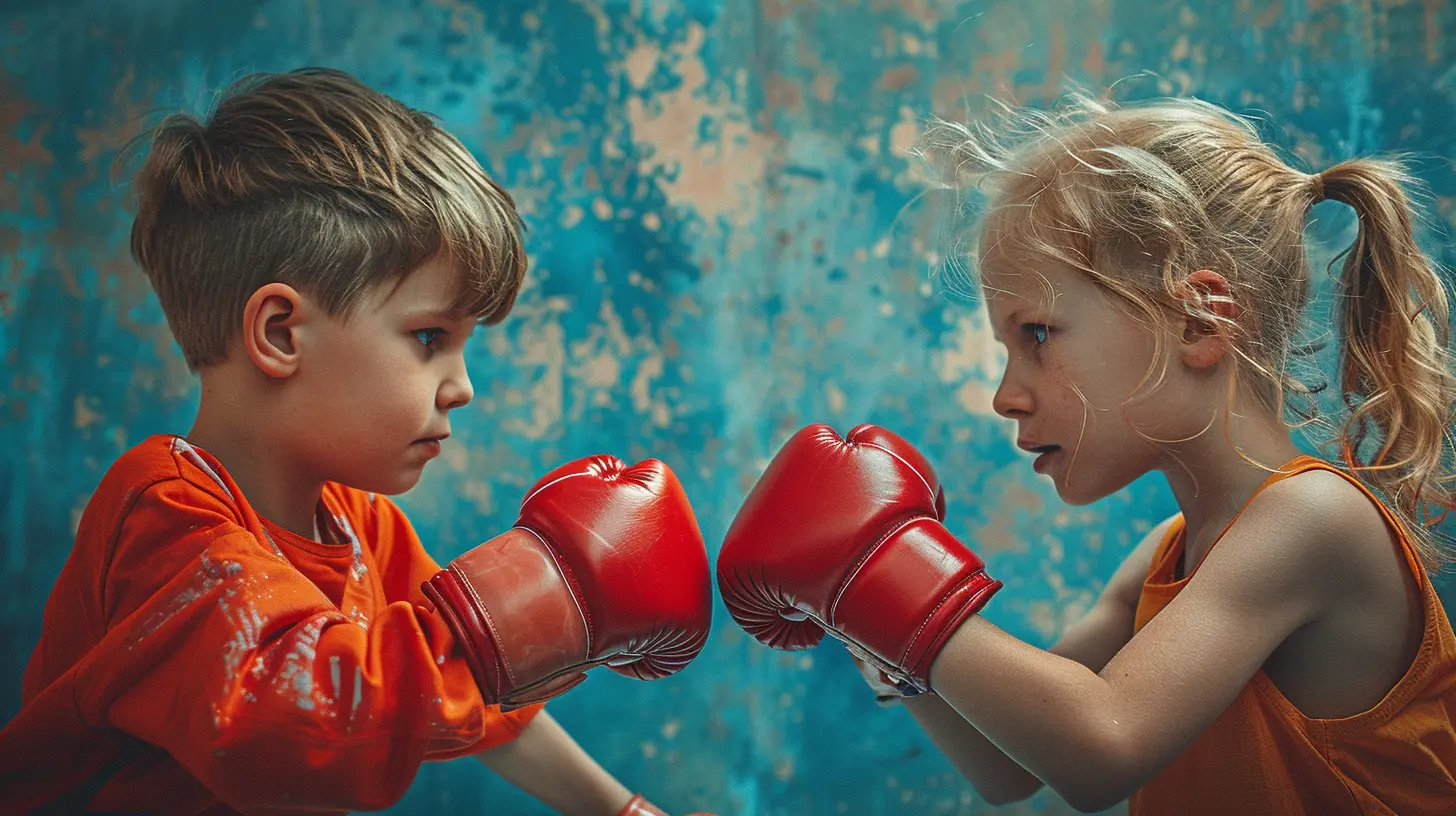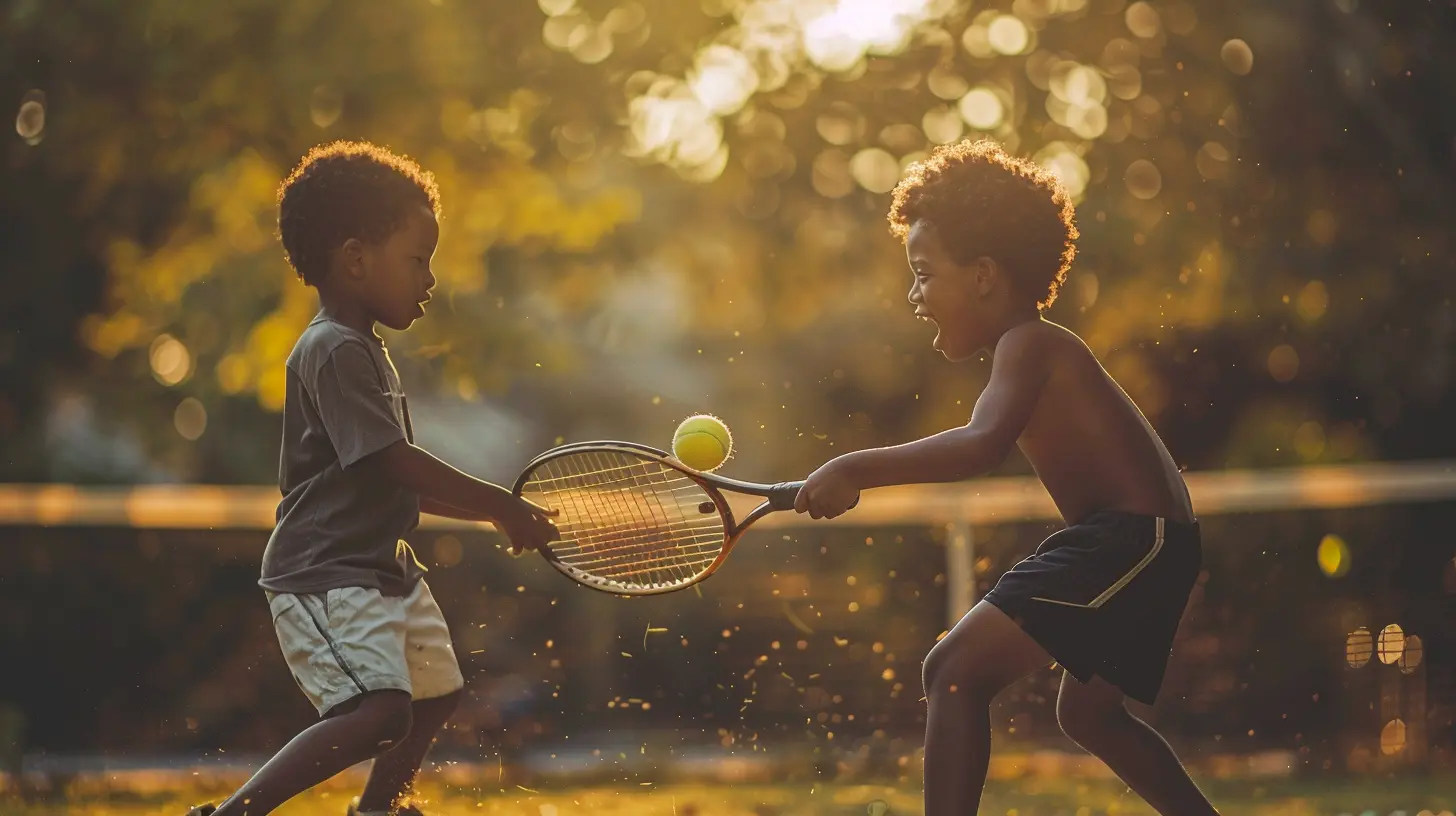How to Foster Healthy Competition Between Siblings in Sports
15 November 2025
Ah, sibling rivalry — the age-old tale of "Who scored more goals in soccer?" or "Who can out-jump the other on the trampoline?" If you're a parent with more than one sports-loving kid, chances are you've witnessed your fair share of backyard brawls disguised as “friendly matches.” While a bit of rivalry can spice things up, uncontrolled competition can lead to tantrums, tears, and the occasional flying cleat.
So, how do you transform that rivalry into roaring support? How can you raise kids who high-five each other after a game rather than give side-eye until bedtime? Buckle up, sports parents — we’re diving into the wonderfully chaotic world of sibling sports competition and how to make it a healthy, uplifting experience for everyone (yes, including your sanity).

Why Sibling Competition Can Be a Good Thing (Yes, Really!)
Let’s get one thing straight — competition isn’t the enemy. In fact, it can be an excellent tool for development. A little sibling competition can:- Build motivation
- Sharpen skills
- Teach resilience
- Encourage teamwork (eventually… we hope)
Think of it like spicy salsa — a little kick adds flavor, but too much? Whew, everyone’s crying and no one wants tacos ever again.
The key is balance. You want the kind of competition that inspires siblings to push each other for the better, not wage a silent war over who gets more minutes on the basketball court.

Step One: Set the Vibe — Not Every Game is the Super Bowl
Let’s start with expectations. You don’t want your kids treating every game like it’s the final round of the Olympics with national pride (and probably snacks) on the line.Emphasize the importance of fun. Seriously, write it on a poster: “If you're not having fun, you’re doing it wrong.” Hang it over the snack cabinet. Make it a family mantra.
Let your children know that sports are for learning, growing, and yes, sometimes falling flat on your face and laughing about it. Wins are cool. Growth is cooler.

Step Two: Applaud the Effort, Not the Scoreboard
Here's where we parents often fumble the ball. It’s tempting to cheer the louder kid or the one who scored the winning point. But doing so can feed resentment faster than you can say “participation trophy.”💡 Hot Tip: Praise effort over results.
Instead of saying, “Wow, Emma, you scored THREE GOALS!” try, “Emma, I saw how hard you hustled out there. Your energy was contagious!”
And don’t forget the other sibling: “Liam, I noticed how you helped your teammate when he fell — that was awesome sportsmanship!”
Effort praise builds a growth mindset. A scoreboard ends at zero. Growth? That’s unlimited, baby.

Step Three: Channel That Competitive Energy Into Teamwork
Here’s a sneaky parenting trick: Get the siblings on the same team. Literally.Whether it’s a neighborhood soccer game, a backyard obstacle course, or a family kickball match, find ways to make them teammates rather than opponents. When they have to depend on each other to win (or at least not fall on their faces), natural collaboration kicks in.
Siblings working together? That’s a parenting jackpot.
Step Four: Create Space for Individual Identity
It’s tempting to sign both kids up for the same sport. Soccer for one? Soccer for all! But forcing both into the same cleats might not be the best call.If Emma’s passion is gymnastics and Liam’s is basketball, honor that. Let them shine in their own arenas. This reduces the constant side-by-side comparison and gives each kid their own stage to be the star.
Bonus? You get variety in your weekend chaos. Nothing says parenting MVP like balancing a beam routine and a full-court press in one Saturday.
Step Five: Keep the Trash Talk in Check (Even If It’s Hilarious)
Sibling trash talk can be chef’s kiss hilarious — until someone throws a shoe.Set boundaries early. Healthy ribbing is one thing (“You run slower than grandma with a walker!”), but personal attacks are another (“You’re the reason we lost!” — cue dramatic exit).
Lay down the ground rules:
- No name-calling
- No blaming
- No sulking like a soap opera character
Teach them the golden rule of competition: “Don’t dish it if you can’t take it... and even better, don’t dish it at all.”
Step Six: Use Challenges to Build Character
Lost a match? Benched for the quarter? These moments can be learning goldmines.Talk to your kids about how to bounce back. Compare it to Super Mario — sometimes you fall down a pipe, but you get back up and still aim for the flagpole.
Ask reflective questions:
- “What did you learn today?”
- “What could you do differently next time?”
- “How did you feel about your play?”
This not only sparks growth but gives you a front-row seat to their emotional development (without paying a therapist’s bill).
Step Seven: Encourage Celebration... and Consolation
If one sibling wins and the other loses, teach them to celebrate victories together and comfort each other in losses. It’s not about one-upping; it’s about lifting each other up — one high-five or hug at a time.Teach the art of being a good winner and an even better loser. No one likes a gloater (except maybe the gloat-er themselves).
Siblings who can cheer each other on with sincerity? That’s Hallmark-movie-level stuff, and it starts with what they see at home.
Step Eight: Lead by Example (Your Sideline Behavior Matters!)
Parents, this one’s for you. If you're shouting at referees, grumbling about the coach, or rolling your eyes when one kid fumbles, your kids will follow suit. Monkey see, monkey yell.Model calm, constructive, and kind behavior from the bleachers. Celebrate small wins. Encourage without pressure. Laugh when things go sideways.
You’re the ultimate coach — even if you couldn’t hit a volleyball if it was underhanded and headed straight for you.
Step Nine: Keep It Light — With a Side of Humor
Laughter is your secret weapon. Make sports lighthearted, and competition becomes something to enjoy, not fear.Have funny pre-game chants. Do “victory dances” in the driveway. Give each other goofy nicknames like “The Toe-Tapper” or “Captain Dribble.”
Humor diffuses tension faster than any timeout.
Step Ten: Know When to Step Back
Last but not least — sometimes, the best thing you can do is nothing.If your kids start managing their rivalry in a healthy way without your intervention? Step aside, Coach. Let them navigate it.
Your job is to be the guide on the side, not the referee in every match they play.
Bonus Tip: Family Game Nights (Because Board Games Count)
Who says healthy competition has to stay on the field? Family board games are great low-stakes practice zones for handling wins, losses, and everything in between.Plus, it’s a perfect chance to see who’s secretly a Monopoly mastermind or a sore loser at Uno. (Spoiler alert: It’s probably you.)
Final Thoughts: Raising Teammates for Life
At the end of the day, sports offer the perfect training ground — not just for future athletic glory, but for life. When siblings learn how to compete with heart, support each other with grace, and laugh through the madness, they’re gaining tools that go far beyond the field.They may not always get along (what siblings do?), but if they can cheer each other on, offer a fist bump when it counts, and recover from that double-dribble incident of 2022 with dignity, you’ve done your job.
And to that — we throw our parenting whistles in the air and yell, “TEAMWORK!
all images in this post were generated using AI tools
Category:
Kids And SportsAuthor:

Steven McLain
Discussion
rate this article
1 comments
Aisha McKeever
Love this! Healthy competition brings out the best in siblings!
November 16, 2025 at 3:53 AM

Steven McLain
Thank you! Absolutely, healthy competition can motivate siblings to excel and strengthen their bond.


